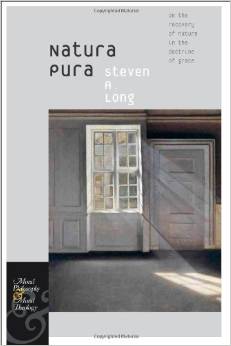Welcome! For the past several years I've been engrossed in a theological debate over Henri De Lubac and his critics over his interpretation of Thomas Aquinas on nature and grace -- sometimes referred to as the
Surnaturel controversy (after the book which provoked it) as well as the debate over the theological conception of "pure nature" (
natura pura) in the theology of St. Thomas Aquinas.
For reference and research purposes, I've set up this blog, being an ongoing compilation of commentary, blog-posts (by myself and others), books, dissertations and academic investigations, etc.
If you have a link that might be worthy of consideration please email me at blostopher [at] gmail [dot] com.
A Brief Introduction to the Debate / Controversy
The debate originates with the publication of Henri De Lubac's Surnaturel in 1946 and the controversy that ensued, in which he charged Thomistic theologians (chiefly from Cajetan onwards) had misunderstood -- and consequently misrepresented, to detrimental effect -- man's relationship to God as a "two tiered" system of nature and the supernatural existing in isolation to each other. According to De Lubac, the theological exchange of the "natural / moral" paradigm for that of "natural / supernatural"; the theoretical consideration of man's "natural end" or state of pure nature [natura pura] as distinct from his calling to the beatific vision, negatively reinforced man's sense of secular autonomy and modernity's abandonment of the divine.
It is important to note here that De Lubac's concern was born of good intentions: horrified with first, French Catholic massive support of the fascist movement Action Francaise in the 1930's, and secondly its collaboration with the Petain’s Vichy regime during the Second World War, which had deported six thousand Jews to Germany from 1941-1945. This was the historical context under which De Lubac developed his theology. Hans Boersma explains (Nouvelle Théologie and Sacramental Ontology):
As de Lubac came to see it, the French cultural and political situation was intimately tied up with the theological question of the relationship between nature and the supernatural. The reason, he believed, why so many accommodated uncritically the fascist neo-paganism of the Vichy regime was the long-standing separation between nature and the supernatural, as if the two formed two hermetically sealed compartments. Such separation, de Lubac believed, granted the realm of nature a nearly autonomous status in relation to the supernatural. In no way related to the supernatural, the realm of nature could move in its own, self-chosen direction, unencumbered by a higher call that the gospel, Jesus Christ, or the Church might issue.
De Lubac's thesis was subjected to fierce criticism from neo-scholastic Thomists like Reginald Garrigou-Lagrange, while he was in turn defended by Etienne Gilson, Hans urs von Balthasar and members of the
nouvelle theologie. (For a detailed historical review of the
surnatural controversy and De Lubac's relationship with Etienne Gilson, see chapter 11: "Ecclesial Cold War", pp. 227-243 in
Art and Intellect in Philosophy of Étienne Gilson).;

Eventually, however, De Lubac's critique of Thomistic neo-scholasticism and what he dubbed the "baroque theology of grace" was adopted wholesale to the extent that he is credited with having "created the intellectual climate that made possible the Second Vatican Council" (Oxford Dictionary of the Catholic Church). De Lubac was also publicly vindicated in 1983 with his elevation to Cardinal by Pope John Paul II.
That being said, the fundamental questions of the surnaturel controversy have never been satisfactorily resolved. Within the past decade, a number of American Thomistic theologians have renewed criticism of De Lubac's position on nature and grace, beginning in large part with the publication of the magisterial work by Lawrence Feingold: The Natural Desire to See God According to St. Thomas and His Interpreters (Catholic University of America Press, 2nd ed., 2004).
(Catholic University of America Press, 2nd ed., 2004).
The English editions of Communio and Nova Et Vetera has also played host to vigorous discussion of the surnatural debate with contributions from Stephen A. Long (author of Natura Pura: On the Recovery of Nature in the Doctrine of Grace ), Reinhold Hutter, Nicholas Healey, Edward T. Oakes SJ and the "Radical Orthodox" theologian John Milbank. For an overview of the debate see Christopher Smith's "Anglophone Theologians engage De Lubac for the Twenty First Century" (excerpt from his 2013 doctoral thesis).
), Reinhold Hutter, Nicholas Healey, Edward T. Oakes SJ and the "Radical Orthodox" theologian John Milbank. For an overview of the debate see Christopher Smith's "Anglophone Theologians engage De Lubac for the Twenty First Century" (excerpt from his 2013 doctoral thesis).
 Natura Pura: On the Recovery of Nature in the Doctrine of Grace (Moral Philosophy and Moral Theology)
Natura Pura: On the Recovery of Nature in the Doctrine of Grace (Moral Philosophy and Moral Theology)